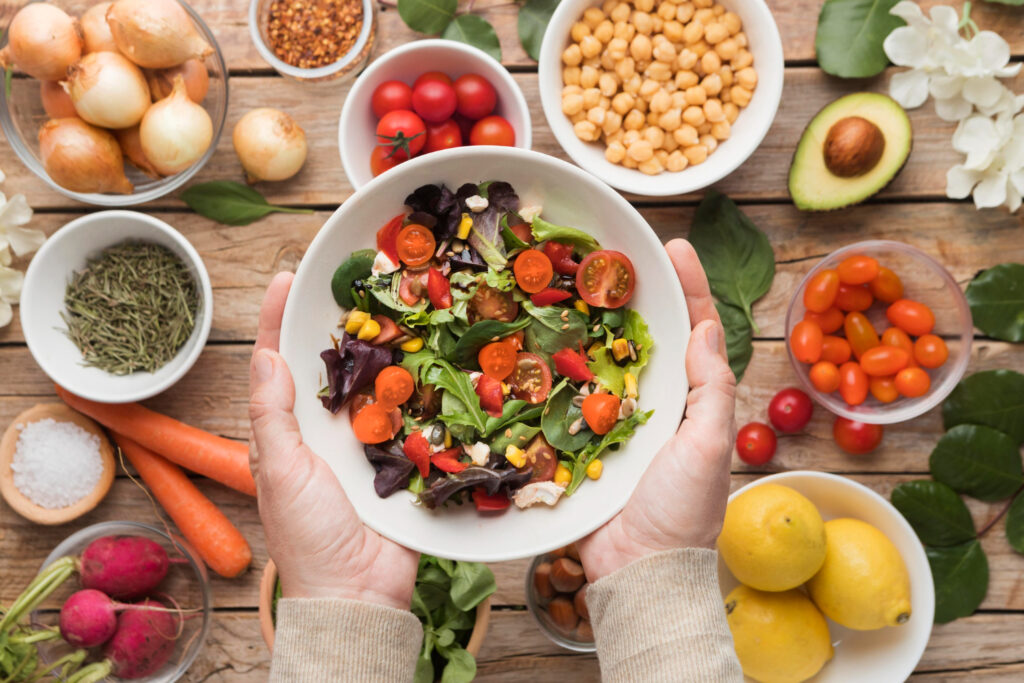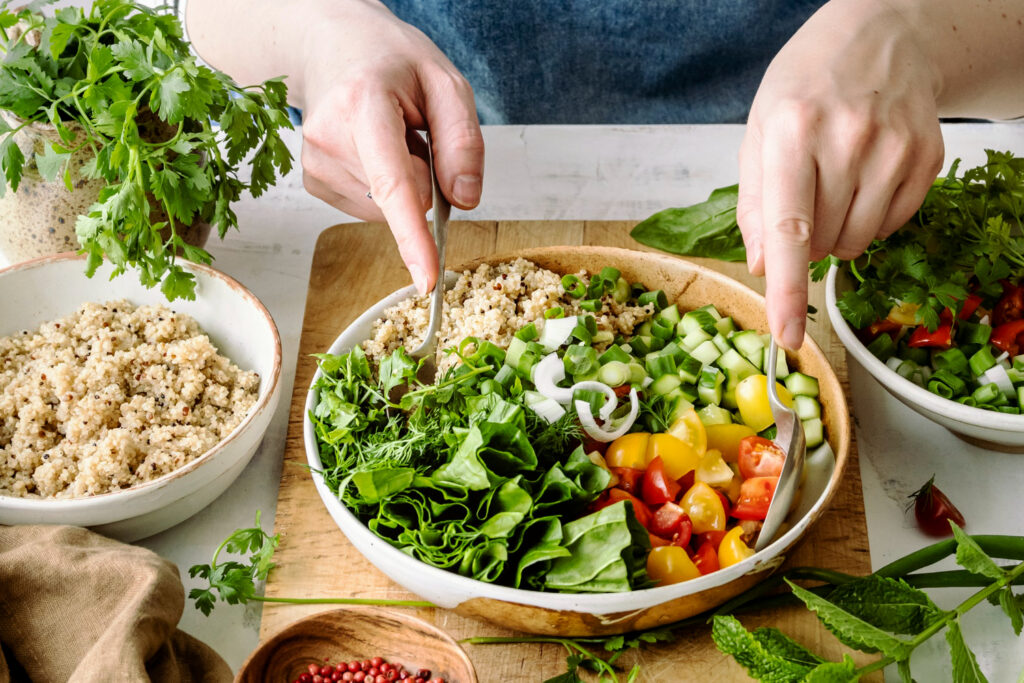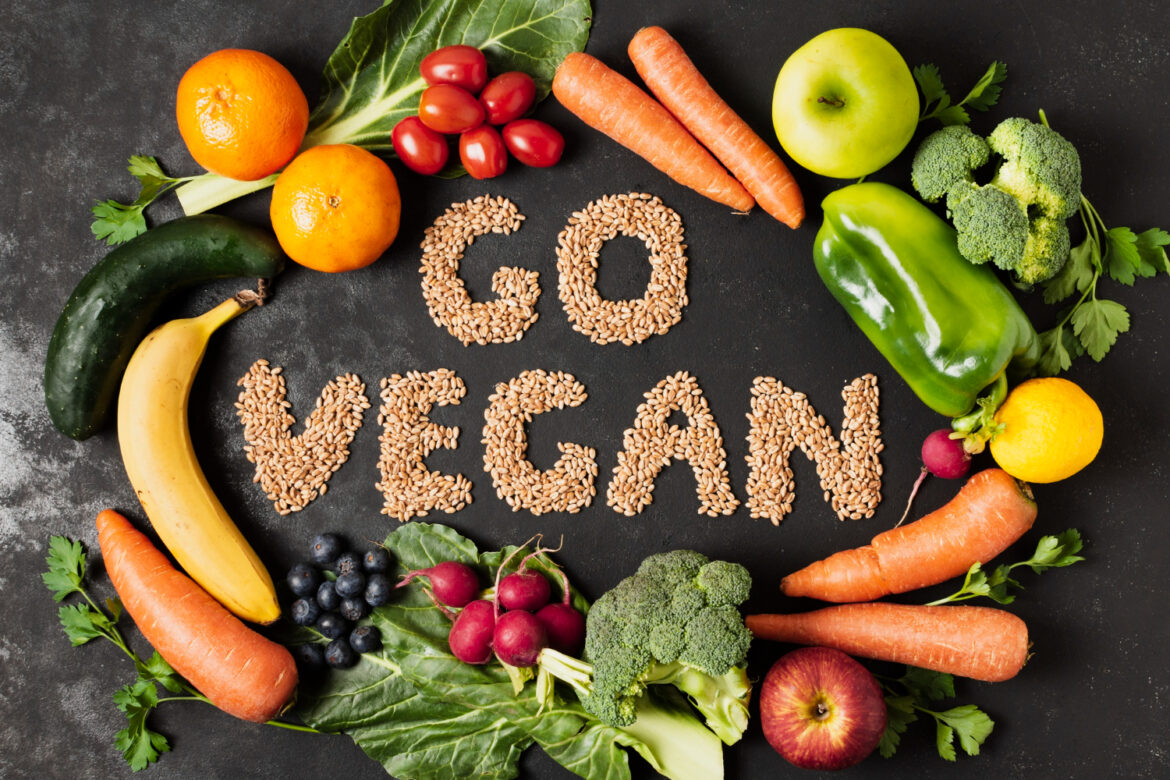Introduction
As the world becomes increasingly aware of the environmental and ethical implications of meat consumption, more and more people are turning to veganism as a lifestyle choice. While a well-planned vegan diet can offer numerous health benefits and align with ethical values, it’s crucial to understand the importance of balanced nutrition to maintain optimal health. In this blog, we’ll provide an overview of essential nutrients for vegans and practical advice on achieving a well-rounded, nutritionally balanced vegan diet. We’ll also discuss common pitfalls to avoid on your journey to becoming a healthier, plant-based eater.
What Is a Vegan Diet?
A vegan diet is a plant-based dietary approach that excludes all animal-derived foods and products. It is a lifestyle choice driven by ethical, environmental, and health considerations. Those who follow a vegan diet, known as vegans, abstain from consuming meat, poultry, fish, dairy products, eggs, and other animal-derived ingredients.
Key Principles of a Vegan Diet:
Plant-Based Foods: A vegan diet primarily revolves around plant-based foods. This includes fruits, vegetables, grains, legumes (beans, lentils, and chickpeas), nuts, seeds, and plant-based alternatives to animal products.
Exclusion of Animal Products: Vegans avoid all forms of animal-derived foods and by-products. This encompasses not only meat and dairy but also items like honey, gelatin, and certain food additives with animal origins.
Ethical Considerations: Many vegans adopt this dietary choice due to ethical concerns related to animal rights and the treatment of animals in the food industry. They aim to minimize their contribution to animal exploitation.
Environmental Consciousness: A significant motivation for veganism is its environmental impact. Plant-based diets tend to have a lower carbon footprint and reduce land and water usage compared to animal agriculture.
Health Benefits: Veganism can provide numerous health benefits when followed thoughtfully. It can contribute to lower cholesterol levels, reduced risk of heart disease, and improved weight management, among others.
Focus on Whole Foods: While it’s possible to find vegan junk food and processed options, many vegans emphasize whole, unprocessed foods for optimal health. This includes fruits, vegetables, whole grains, and minimally processed plant-based proteins like tofu and tempeh.
Common Foods in a Vegan Diet:
Fruits and Vegetables: A diverse array of colorful fruits and vegetables provides essential vitamins, minerals, and antioxidants in a vegan diet.
Grains: Whole grains like rice, quinoa, oats, and whole wheat form the basis of many vegan meals, offering carbohydrates and fiber.
Legumes: Beans, lentils, chickpeas, and peas are excellent sources of plant-based protein and fiber.
Nuts and Seeds: These provide healthy fats, protein, and a variety of micronutrients. Almonds, walnuts, flaxseeds, and chia seeds are common choices.
Plant-Based Milk: Alternatives like almond milk, soy milk, and oat milk offer dairy-free options for beverages and cooking.
Tofu and Tempeh: Soy-based products like tofu and tempeh are versatile protein sources that can be used in various dishes.
Plant Oils: Olive oil, coconut oil, and avocado oil are commonly used for cooking and dressing salads.
Herbs and Spices: These add flavor to vegan dishes, allowing for diverse and delicious meals.
Plant-Based Alternatives: Many vegan substitutes for animal products are available, such as vegan cheese, plant-based burgers, and dairy-free ice cream.
It’s important to note that while a vegan diet can offer numerous health benefits, it requires careful planning to ensure all essential nutrients are obtained. Paying attention to nutrients like protein, vitamin B12, calcium, iron, and omega-3 fatty acids is crucial to maintain a balanced and nutritionally adequate vegan lifestyle. Consulting with a registered dietitian can provide personalized guidance to help individuals meet their dietary needs while following a vegan diet.

Essential Nutrients for Vegans
- Protein : Protein is essential for muscle repair, immune function, and overall growth and development. Plant-based sources of protein include tofu, tempeh, legumes (beans, lentils, and chickpeas), nuts, seeds, and whole grains like quinoa and bulgur. Ensure that you incorporate a variety of these protein sources into your diet to meet your daily requirements.
- Iron : Iron is crucial for transporting oxygen throughout the body. While heme iron from animal products is more readily absorbed, non-heme iron from plant sources is also valuable. Good vegan sources of iron include fortified cereals, beans, lentils, spinach, tofu, and pumpkin seeds. To enhance iron absorption, consume vitamin C-rich foods like citrus fruits, bell peppers, or strawberries alongside iron-rich foods.
- Calcium : Calcium is vital for strong bones and teeth. Vegan sources of calcium include fortified plant-based milk (such as almond, soy, or oat milk), tofu, leafy greens (kale, collard greens, bok choy), and fortified orange juice. Consider taking a calcium supplement if your diet doesn’t provide enough calcium-rich foods.
- Vitamin D : Vitamin D is essential for bone health and overall immune function. While it’s primarily obtained through sunlight exposure, many vegan foods are also fortified with vitamin D, like fortified plant-based milk and some cereals. If you live in an area with limited sunlight, consult your healthcare provider about a vitamin D supplement.
- Vitamin B12 : Vitamin B12 is crucial for nerve function and the production of red blood cells. It’s mainly found in animal products, so vegans should take a B12 supplement or consume fortified foods like nutritional yeast, fortified plant-based milk, or breakfast cereals. Regular blood tests can help monitor your B12 levels.
- Omega-3 Fatty Acids : Omega-3 fatty acids, particularly EPA and DHA, are essential for heart and brain health. Vegan sources of these fatty acids include flaxseeds, chia seeds, walnuts, hemp seeds, and algae-based supplements. Aim to include these in your diet regularly.
- Iodine : Iodine is essential for thyroid function and is commonly found in seafood. Vegans can obtain iodine from iodized salt, seaweed, and iodine-fortified salt. Be cautious not to overconsume seaweed, as excessive intake can lead to thyroid issues.
Practical Tips for a Balanced Vegan Diet
- Diversify Your Diet : Variety is key to a balanced vegan diet. Different foods provide different nutrients, so aim to incorporate a wide range of fruits, vegetables, grains, legumes, nuts, and seeds into your meals.
- Plan Your Meals : Take the time to plan your meals and snacks to ensure you’re meeting your nutritional needs. Use meal planning apps or consult with a registered dietitian if needed.
- Read Labels : Be diligent about reading food labels to check for hidden animal-derived ingredients like gelatin, casein, or rennet. Look for vegan-certified products if you want to be sure.
- Cook at Home : Cooking at home gives you full control over your ingredients and allows you to experiment with vegan recipes. It can also be more cost-effective than dining out regularly.
- Be Mindful of Processed Foods : While there’s a growing market for vegan processed foods like vegan burgers and vegan cheese, these should be consumed in moderation. They can be high in sodium, saturated fats, and additives.
- Stay Hydrated : Drink plenty of water throughout the day to stay hydrated. Herbal teas and infused water are excellent choices to add variety to your fluid intake.
- Ensure Adequate Vitamin B12 Intake : Vitamin B12 is essential for nerve function, red blood cell production, and overall health. Since it is primarily found in animal-derived foods, vegans need to pay special attention to their B12 intake. Here are some ways to ensure you get enough:
- Include B12-fortified foods: Look for plant-based milk, breakfast cereals, and meat substitutes that are fortified with vitamin B12.
- Take a B12 supplement: Many vegans opt for B12 supplements to meet their daily requirements. Consult with a healthcare provider or registered dietitian for guidance on the appropriate dosage.
- Nutritional yeast: Nutritional yeast is a popular ingredient in vegan cooking that provides B12. It can be sprinkled on various dishes to enhance flavor while boosting your B12 intake.
- Regular monitoring: To ensure you maintain adequate B12 levels, consider having your vitamin B12 levels checked through blood tests.
- Including reliable sources of vitamin B12 in your diet or taking supplements as needed can help prevent deficiency-related health issues.
Incorporating these practical tips into your vegan lifestyle will not only help you maintain a well-balanced diet but also ensure you’re meeting your nutritional needs for optimal health and well-being.

- Fiber-Rich Foods : Plant-based diets are naturally high in fiber, which supports digestive health and helps maintain a healthy weight. Incorporate fiber-rich foods like whole grains, legumes, fruits, and vegetables into your daily meals.
- Limit Processed Vegan Foods : While convenient, many processed vegan foods are high in salt, sugar, and unhealthy fats. Opt for whole, unprocessed foods as much as possible to maximize nutritional benefits.
- Calcium Absorption : Some plant-based foods, like spinach and Swiss chard, contain oxalates that can interfere with calcium absorption. Balance these foods with other calcium-rich options and consider cooking them to reduce oxalate levels.
- Zinc : Zinc is essential for immune function and wound healing. Vegan sources of zinc include legumes, nuts, seeds, and whole grains. To enhance absorption, consume zinc-rich foods separately from high-phytate foods like grains and legumes.
- Protein Combinations : To ensure you’re getting a variety of amino acids (the building blocks of protein), combine different protein sources in your meals. For example, pair beans with rice or quinoa with tofu.
- Fortified Foods : Many plant-based foods are fortified with essential nutrients to help vegans meet their nutritional needs. These include fortified plant-based milk, breakfast cereals, and meat alternatives.
- Nutritional Yeast : Nutritional yeast is a vegan pantry staple that provides a cheesy flavor and is rich in B vitamins, especially B12. Sprinkle it on dishes like pasta, popcorn, or roasted vegetables for added nutrients.
- Omega-3 Sources : In addition to seeds and nuts, consider incorporating algae-based supplements or algae oil into your diet to ensure a reliable source of EPA and DHA omega-3 fatty acids.
- Snacking Wisely : When snacking, choose nutrient-dense options like raw vegetables with hummus, mixed nuts, or fruit with nut butter to keep your energy levels steady.
- Hydration : Adequate hydration is essential for overall health. Water-rich fruits and vegetables like cucumbers, watermelon, and citrus fruits can contribute to your daily fluid intake.
- Avoid Restrictive Eating : Don’t fall into the trap of overly restrictive vegan diets, such as fruitarian or raw vegan diets, without proper planning. These diets can lead to nutrient deficiencies if not balanced correctly.
- Consider Supplements : While you can obtain most nutrients from a well-rounded vegan diet, some individuals may benefit from supplements, especially vitamin D, B12, and iodine. Consult with a healthcare provider to determine if supplementation is necessary.
- Listen to Your Body : Pay attention to your body’s signals. If you experience unusual fatigue, changes in skin or hair health, or digestive issues, consult with a healthcare provider or registered dietitian to address any nutritional concerns.
Achieving a well-balanced vegan diet requires careful consideration of nutrient intake, variety, and food choices. By staying informed about essential nutrients and following practical tips, you can enjoy the health benefits of a plant-based lifestyle while minimizing common pitfalls. Remember that individual nutritional needs can vary, so consulting with a healthcare provider or registered dietitian for personalized guidance is always a wise choice when transitioning to or maintaining a vegan diet.
Common Pitfalls to Avoid
1. Not Eating Enough Calories : Some individuals transitioning to a vegan diet may unintentionally consume fewer calories, leading to fatigue and nutrient deficiencies. Ensure you’re eating enough to meet your energy needs.
2. Neglecting Protein : Protein is essential for maintaining muscle mass and overall health. Don’t skimp on protein-rich foods, and consider consulting a dietitian to determine your protein requirements.
3. Ignoring B12 Supplementation : Vitamin B12 deficiency can lead to serious health issues. Don’t forget to take a B12 supplement or consume fortified foods regularly.
4. Overloading on Junk Food : Just because a food is vegan doesn’t mean it’s healthy. Chips, cookies, and sugary cereals can still be part of a vegan diet, but they should be consumed in moderation.
5. Not Tracking Nutrient Intake : While a well-balanced vegan diet can be nutritionally adequate, it’s essential to track your nutrient intake, especially when starting. Consider using a nutrient tracking app to ensure you’re meeting your daily requirements.
Conclusion
A vegan diet can be both healthy and sustainable, but it requires careful planning and consideration of nutrient intake. By including a variety of plant-based foods, being mindful of essential nutrients, and avoiding common pitfalls, you can achieve a well-rounded, nutritionally balanced vegan diet. If you have specific dietary concerns or are unsure about meeting your nutritional needs, consult with a registered dietitian who specializes in vegan nutrition to create a personalized plan for optimal health and well-being on your vegan journey.
